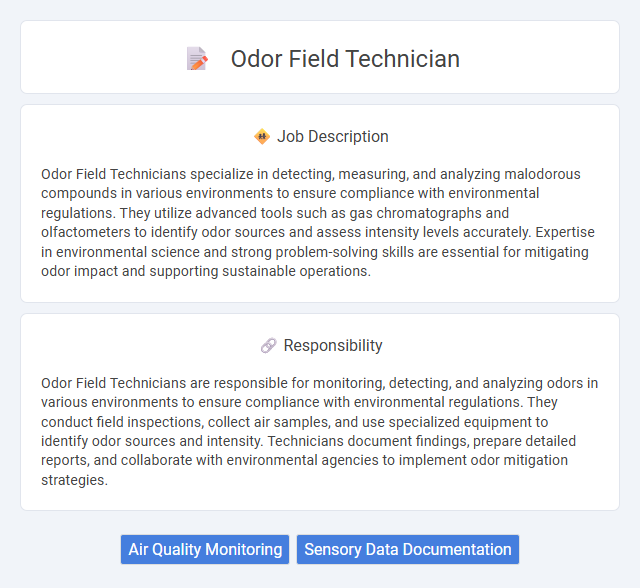
Odor Field Technicians specialize in detecting, measuring, and analyzing malodorous compounds in various environments to ensure compliance with environmental regulations. They utilize advanced tools such as gas chromatographs and olfactometers to identify odor sources and assess intensity levels accurately. Expertise in environmental science and strong problem-solving skills are essential for mitigating odor impact and supporting sustainable operations.
Individuals with a strong sense of smell and good physical health are likely suitable for the Odor Field Technician role, given the job's reliance on detecting and identifying various odors in diverse environments. Those with respiratory conditions or sensitivities to strong smells may find the position challenging or unsuitable due to potential exposure to hazardous or overpowering odors. The job may require individuals who can handle outdoor work and variable weather conditions, which may also affect the suitability for some candidates.
Qualification
An Odor Field Technician must possess a high school diploma or equivalent, with preferred certifications in environmental science or hazardous materials handling. Strong knowledge of air quality monitoring equipment and safety protocols is essential for effectively detecting and documenting odor sources in the field. Experience in conducting odor sampling, interpreting sensory data, and maintaining detailed reports enhances job performance and regulatory compliance.
Responsibility
Odor Field Technicians are responsible for monitoring, detecting, and analyzing odors in various environments to ensure compliance with environmental regulations. They conduct field inspections, collect air samples, and use specialized equipment to identify odor sources and intensity. Technicians document findings, prepare detailed reports, and collaborate with environmental agencies to implement odor mitigation strategies.
Benefit
Odor Field Technicians likely experience benefits such as hands-on training, providing opportunities for skill development in environmental monitoring. The role may offer competitive wages and potential for career advancement within environmental services. Benefits could also include working outdoors in varied locations, which might appeal to those preferring dynamic work environments.
Challenge
An Odor Field Technician likely faces the challenge of accurately detecting and measuring various odors in diverse environments, requiring keen sensory skills and specialized equipment. There is a probability of encountering fluctuating odor sources and weather conditions that complicate data collection and analysis. Handling these challenges effectively might demand continuous training and adaptability to ensure precise and reliable environmental assessments.
Career Advancement
Odor Field Technicians gain specialized expertise in environmental monitoring, positioning themselves for advancement into roles such as Environmental Technologists or Compliance Managers. Mastery in scent detection technologies and regulatory standards enhances career growth opportunities within environmental consulting firms. Continuous certification and field experience open pathways to supervisory and project management positions in the odor control industry.
Key Terms
Air Quality Monitoring
Odor Field Technicians specialize in air quality monitoring by detecting and analyzing odor emissions from industrial or environmental sources. They utilize advanced instruments such as electronic noses, gas chromatography, and olfactometers to collect and interpret air samples, ensuring compliance with environmental regulations. Their expertise supports effective odor management and pollution control strategies to protect public health and maintain regulatory standards.
Sensory Data Documentation
Odor Field Technicians specialize in collecting and documenting sensory data related to odor intensity, character, and source location through systematic field sampling and olfactometry techniques. Precise sensory data documentation enhances environmental compliance reporting and odor management strategies by providing accurate records for regulatory agencies and stakeholders. Mastery in data logging software and standardized odor measurement protocols ensures consistency and reliability in odor impact assessments.
 kuljobs.com
kuljobs.com